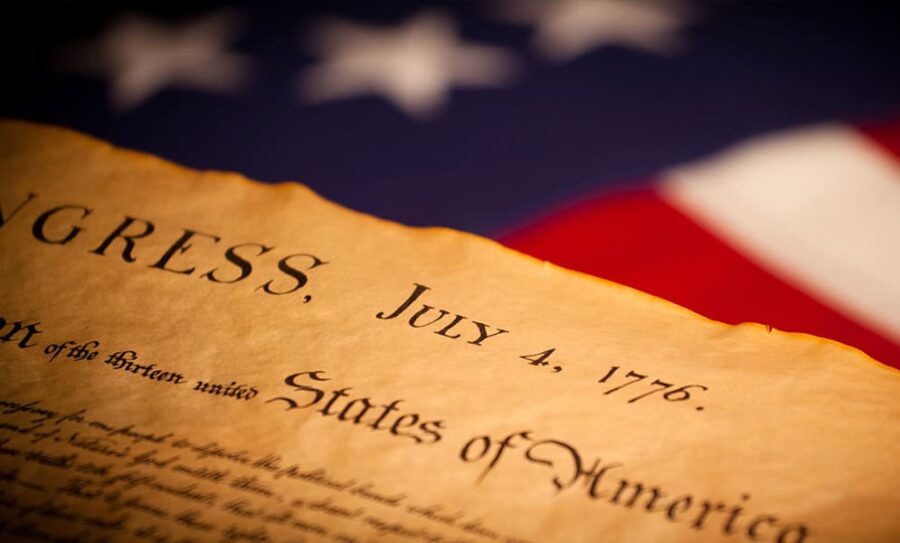The Promise of July 4th
“We hold these truths to be self-evident, that all men are created equal, that they are endowed by their Creator with certain unalienable Rights, that among these are Life, Liberty and the pursuit of Happiness.—That to secure these rights, Governments are instituted among Men, deriving their just powers from the consent of the governed,—That whenever any Form of Government becomes destructive of these ends, it is the Right of the People to alter or to abolish it, and to institute new Government, laying its foundation on such principles and organizing its powers in such form, as to them shall seem most likely to effect their Safety and Happiness.”
The promise of July 4th is to remember and reclaim the purpose of good government—that is, to secure its citizens’ rights. The word “right” carries enormous weight in our political tradition. The very foundation of our nation rests on the existence and universality of pre-political rights—truths grounded not in government recognition, but in human nature itself. Good governments exist to protect these timeless, natural laws.
The securing of natural rights is the highest calling of any just government. This means dedicating political power and resources to protecting those rights. When something is designated as a “right,” it is elevated beyond the uncertainty of a free society and placed under the public trust as a matter of justice, with the promise of legal protection and enforcement. It is no surprise that, throughout history, passionate advocates have invoked this authoritative label to advance their causes.
The term “right” loses its sanctity when applied indiscriminately. When anything and everything becomes a right, the concept is diluted, and the essence of liberty is lost. To abandon our shared understanding of rights is to abandon the very aim of good government. Without a clear commitment to identifying and defending genuine natural rights, we are left vulnerable to all sorts of tyranny. If we are to preserve liberty, we must recover the true meaning of rights.
What Are Natural Rights? Understanding Our Constitutional Foundation
Webster’s 1828 Definition of Rights and Natural Law
Written within decades of The Declaration of Independence’s publication, Webster’s 1828 Dictionary defines right as:
“10. Just claim; immunity; privilege. All men have a right to the secure enjoyment of life, personal safety, liberty and property. We deem the right of trial by jury invaluable, particularly in the case of crimes. Rights are natural, civil, political, religious, personal, and public.”1
Historically, rights were understood as moral claims rooted in natural law—not benefits conferred by rulers.
Webster defined natural law as:
“3. Law of nature, is a rule of conduct arising out of the natural relations of human beings established by the Creator, and existing prior to any positive precept. Thus it is a law of nature, that one man should not injure another, and murder and fraud would be crimes, independent of any prohibition from a supreme power.”1
In other words, natural law exists inherently, prior to legislation.
Just laws are not the source of rights; they are attempts to describe and codify what already exists within the created order. Just as Newton did not create gravity, but discovered and articulated it, so too do jurists and philosophers discover the moral laws embedded in our humanity.
Why Natural Rights Are Negative Rights
Rights are best described in two ways: first, as natural rights, meaning they are embedded in the law of nature (or natural law); and second, as negative rights, meaning they are defined by what they protect the individual from.
Negative rights serve to shield individuals from coercion or interference, particularly in matters of life, liberty, and property.
Just as the known laws of physics have been discovered and tested by many thinkers throughout time, so too have the natural laws that govern human relationships. Philosophers and texts throughout history have named, questioned, and argued these principles: from the scriptural revelation to Homer; to Socrates, Plato, and Aristotle; to Cicero and the Roman jurists; to Augustine and Aquinas; to Hobbes and Locke; then to Blackstone and the American Founders.
Natural rights are not modern theories subject to cultural whims—they are invoking ancient truths rooted in revelation (general and special), logic, and reason. Rights are universal, inalienable, and God-given—not subject to the will of governments but placed above them. This is the foundation that gave moral weight to our Declaration.
These rights are rooted in the Judeo-Christian worldview, which asserts that every individual bears dignity by virtue of being made in the image of God (Imago Dei). Because God gave life, the individual has the right and the responsibility to steward it.
These natural rights found legal expression in the U.S. Constitution: freedom of speech, religion, press, self-defense, due process, and so on. Rights of this kind require nothing from one’s neighbor but non-interference and promise protection from others who would trespass.
In this paradigm:
- You have the right to worship, but not the right to be provided a place of worship.
- The right to bear arms, not the right to a government-issued firearm.
- The right to property, not the right to be given land.
The Critical Shift: How Positive Rights Undermine Individual Liberty
Roosevelt’s Second Bill of Rights and Modern Entitlements
In the 20th century, this paradigm began to shift. Influenced by Roosevelt’s “Second Bill of Rights” and Marxist theory, governments and philosophers began promoting positive rights—the right to something (housing, healthcare, education).
Why Positive Rights Require Government Coercion
However, in these cases, the concept of “positive rights” requires coercion. It demands that someone else’s labor, property, or income be seized by the state and redistributed, violating the negative rights of others. Consequently, through studying the historical understanding of rights, we are forced to wrestle with the reality that these types of positive rights cannot be actual rights, or at least not categorically the same kind of thing as natural rights.
The Incompatibility: Positive Rights Undermine Negative Rights
The irony of these “positive rights” is that they necessitate the violation of actual or negative rights. For example, if one person has a right to healthcare, another must be compelled to provide or fund it. In effect, someone gains an entitlement at the expense of another’s liberty or property. The moral claim to one right leads to the moral violation of another.
Positive rights blur the line between necessity and justice. While food, shelter, and health care are essential to flourishing, calling them “rights” risks undermining the very liberties that made protecting natural rights possible in the first place. Instead, we need to have the clarity and wisdom to recognize these commodities as objects of personal responsibility, so we can look for solutions to secure them for ourselves and voluntarily help provide them for those in need.
Education Rights Debate: Access vs Government-Funded Provision
Education—a cherished good—has not been exempt from this distortion. Once seen as a moral duty and private responsibility, education has become a state-administered entitlement. Skeptics of this shift are often accused of devaluing education, but in truth, they are defending its deeper legacy.
The Difference Between Right to Learn and Right to Free Schooling
Advocates of the “right to education” argue that the state must guarantee provision, not merely protect access. However, after examining this topic of “rights” more thoroughly, should we consider a right to education as a right to learn, or as a right to government-funded schooling?
When education is declared a positive right:
- The state defines what qualifies as “education.”
- Parents lose authority, and educators become agents of the state.
- Taxpayers are forced to fund programs they may not support—trading liberty for entitlement.
Conclusion: Reclaiming the Spirit of ’76
What the Founding Fathers Really Meant by “Securing Rights”
This Independence Day, we should remember the reason for our nation’s birth:
“That to secure these rights, Governments are instituted among Men…”
The Founders didn’t fight for government programs. They fought for liberty and justice based on natural law discovered through reason and revelation. They fought for the sacred, individual right to self-governance—a right given by God, not granted by man.
If we believe that all men are created equal, we must reject any modern definition of rights that makes us unequal by taking from one to give to another.
How to Protect Natural Rights from Government Overreach
This Independence Day, let us remember:
Liberty is not the government’s to give. It is ours to defend.
The price of liberty is eternal vigilance, not endless entitlement.
Read more on liberty here.





